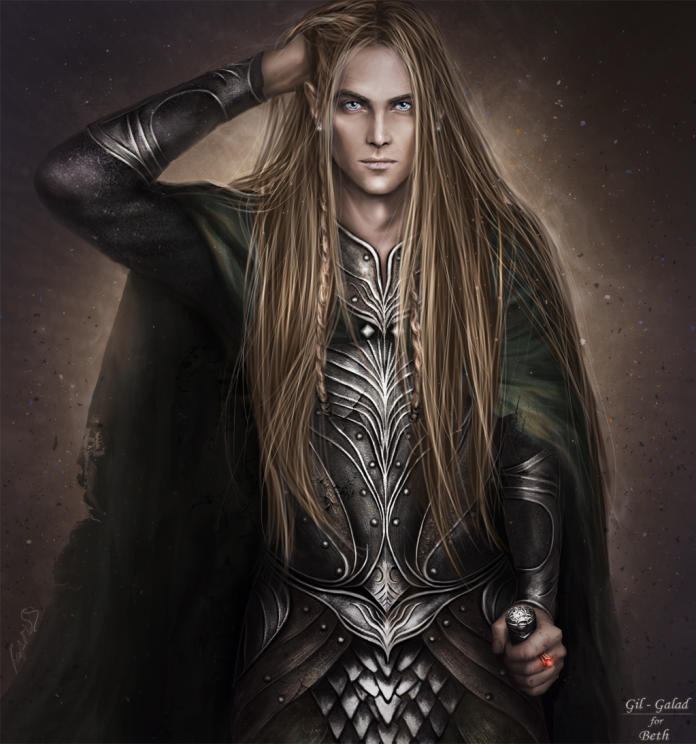Gil-galad, the Elven King
As Frodo, Sam, Merry, Pippin, and Strider look out from the peaks of Weathertop while being pursued by the Black Riders, Sam recites a lay:
Gil-galad was an Elven-king.
Of him the harpers sadly sing;
the last whose realm was fair and free
between the Mountains and the Sea.
His sword was long, his lance was keen.
His shining helm afar was seen;
the countless stars of heaven’s field
were mirrored in his silver shield.
But long ago he rode away,
and where he dwelleth none can say;
for into darkness fell his star
in Mordor where the shadows are.
~ “The Fall of Gondolin”, The Fellowship of the Ring
This lay discusses Gil-galad, the great Elven-king and the last High King of the Noldor. Extensively covered in the Silmarillion and Unfinished Tales, Gil-galad is arguably one of the best characters in the legendarium, known in mythology as a powerful ruler who possessed wisdom, perspicacity, and compassion for his subjects. Although featured only briefly in the film adaptations of The Lord of the Rings, he is explored more as a character in The Lord of the Rings: The Rings of Power, released in 2022. Since its release, there has been controversy surrounding the depiction of Gil-galad and renewed efforts to bring to light Gil-galad’s portrayal in Tolkien’s texts. As a central figure in the history of Middle-Earth, his life and undeniable influence on the peoples of this world are explored here.
A Quick Biography
Gil-galad was born in year 1481 of the First Age. His name carried the meaning “Star of Radiance” in Sindarin. He was born in the House of Finarfin. Although accounts of his parentage vary throughout Tolkien’s texts, he has been described in The Silmarillion and Unfinished Tales as either the son of Fingon or the son of Orodreth. When Gil-galad was 477 years of age, a mere elven-child, the Elves were plunged into the Dagor Bragollach (the “Battle of Sudden Flame”), a mighty battle between the forces of Morgoth and the Noldor. To ensure his safety, his father sent him to the Havens under the care of Círdan the Shipwright. Gil-galad remained here until the Nirnaeth Arnoediad (the “Battle of Unnumbered Tears”) in F.A. 472, during which the forces of Morgoth destroyed the Havens and forced both Gil-Galad and Círdan to take refuge in the Isle of Balar. Turgon was named High King of the Noldor after Fingon lost his life in this battle, and he established his rule in the great Elven city of Gondolin. However, more tragedy descended upon the young Elf with the death of Turgon in F.A. 510 during the Fall of Gondolin, after which Gil-galad received the Kingship of the Noldor. Instead of departing to the Undying Lands with much of his kin, he chose to remain in Middle-Earth, and this decision would mark the beginning of his influence on the history of Middle-Earth as well as the end of the First Age.
In year 1 of the Second Age, Gil-galad established his realm in Lindon, also known as Rivendell, and slowly amassed power and territory for his people. At the height of his rule, his kingdom extended from the Misty Mountains to the forests of Mirkwood to Belegaer, the Great Sea. He was known to all as a wise and fair ruler, and it was in this era that Gil-galad was introduced as a character in The Rings of Power. Around the Year 1000 of the Second Age, both Gil-Galad and Elrond were visited by a mysterious stranger who called himself Annatar, who offered him gifts in exchange for residence in his lands and his confidence. Gil-Galad was one of the few who perceived deception and maliciousness in this stranger, and he warned the Elves in other realms not to trust this man. Despite his warnings, Annatar was received with Eregion and there taught the Elves how to make the Rings of Power. Gil-Galad’s hesitancy was proved true, as this stranger was revealed to be Sauron. After Sauron secretly forged the One Ring, he demanded the remaining Rings of Power to ensure his dominion of Middle-Earth. Celebrimbor, the architect of the Rings, entrusted the Elven Rings Vilya and Narya to Gil-Galad, who later passed them to Elrond and Círdan.
For many hundreds of years, Sauron attempted multiple times to invade Eriador and establish a stronghold in these lands, but he was repelled each time by the forces of Gil-Galad and the Númenorians, who had established an alliance. Eventually, Sauron was brought as a prisoner to the Kingdom of Númemor, allowing Gil-Galad to rule in peace and expand his realm and power to impressive levels. However, in S.A. 3319, the Kingdom of Númenor fell in no small part to Sauron’s deception, allowing Sauron to return to Middle-Earth and establish power in the land of Mordor. The survivors of the fallen Númemorian kingdom, known as the Faithful, were able to establish a home in the lands of Ardor and Gondor under their king Elendil with the support of Gil-galad.
After Sauron launched an attack on Gondor in S.A. 3429, Elendil and Gil-galad formed an alliance to repeal Sauron once and for all, known as the Last Alliance of Elves and Men. Wielding Aeglos, his famed spear, Gil-galad and Elendil slowly marched on Mordor and pushed against the Orc forces until they confronted Sauron himself during the Siege of Barad-dûr in S.A. 3434. At the end of this 7-year battle, they inflicted significant wounds on Sauron, allowing enough weakness for Isildur to remove the One Ring from his hand. However, in this process, Gil-galad received mortal wounds from “the heat of Sauron’s hand,” and perished, passing to the Halls of Mandos. Thus ended the lives of one of the greatest Elves in the history of Middle-Earth and so too the kingship of the Noldor.
Gil-galad in The Lord of the Rings: The Rings of Power
Gil-galad was doubtlessly an incredibly well-written and influential character in Tolkien’s works, so there was much palpable expectation, speculation, and excitement surrounding his portrayal in The Lord of the Rings: The Rings of Power. However, there was much disappointment surrounding the less-than-accurate presentation of Gil-galad, who was relegated to a secondary role in the show and profoundly mischaracterized.
Gil-galad was introduced in the show as the High King of the Noldor during the Second Age, who ruled his vast kingdom from Rivendell. When Galadriel returns from a quest across the Forodwaith, she explains to Gil-galad that she had uncovered evidence proving that Sauron had returned to Middle-Earth and was slowly rebuilding his power. As she tells him this, he views her with poorly veiled skepticism, seemingly refusing to believe her assertions. Instead, he chooses to “reward” her and her company by instructing them to cross the Sundering Seas and live out the remainder of their lives in the Undying Lands. While such a journey was considered rewarding and fateful for many Elves, it is not-so-subtly implied that this was a form of banishment for her disobedience and lack of complacency. This decision is especially astounding, not only because it reflects profound arrogance and unintelligence, but also because Galadriel is 13,000 years older than him and is well known for her wisdom and insight.
Later in the show, Gil-galad confesses to Elrond that while he does believe that Sauron has returned, he is convinced that seeking him out may lead to a bigger threat, a thought that is not entirely explained but seems appropriately vague and mysterious. This is nothing but a poorly veiled metaphor for appeasement, a governing style that conflicts directly with Gil-galad’s true personality and history as a ruler. Time and time again in the histories, he had been vigilant about forming alliances to circumvent Sauron’s growing influence and aggressive about repelling his forces. In the show, Gil-galad also recruits Elrond to meet Celebrimbor and assist him in the forging of the three Elven Rings, which would involve forcibly stealing mithril from the Dwarves, a plot line that is firstly inaccurate (it was not Gil-galad’s people who forged the Rings) and secondly throws Gil-galad into the muck kicked up by the well-known conflict between the Elves and Dwarves.
Essentially, the show’s Gil-galad is a politician – a man who will stop at nothing to ensure the superficial peace of his people at the expense of truth, honor, good judgment, and the rest of the world. While serving as an arguably necessary antagonist focus in the show, the mischaracterization of Gil-galad is damaging to the character himself as well as the state of Elven relations with the rest of the world. Throughout the histories, he has been shown as a ruler who is known to fight for his people, labored to make the Elven kingdom as powerful as it was, fight against evil and tyranny, form alliances with all the races of Middle-Earth, and ultimately compromise his own personal safety to ensure peace in the rest of the world. As such, Gil-galad was arguably one of the greatest Elves to live in Middle-Earth, and as such deserves to have his legacy honored in the way it should.







